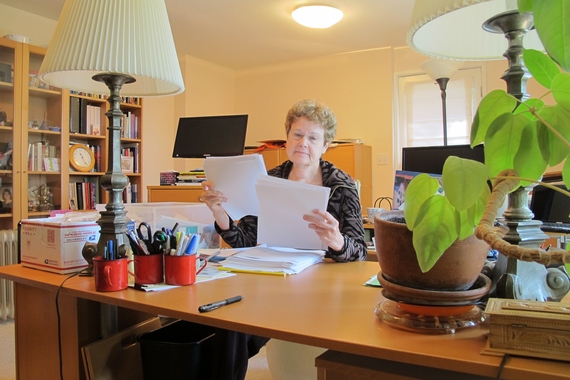Editors are a good thing. That's what my boss at Look magazine once told me. His name was John Osmundson. He was a science writer at Look, and I was his secretary. (This was in the olden days, back when people had secretaries.)
I've held John's advice close ever since he gave it to me. And his words have surfaced again in recent weeks as the time has come to put the final tweaks and edits on my book manuscript so that my editor can send it off to be formatted and published.
It's been years since I started work on "Wrestling with God." I've written draft after draft and tried format after format. I've been wrestling with that manuscript and what I want this book to be as fiercely as I've been wrestling with God and what that might be.
And now my editor at Patheos Press tells me that, in addition to making my last-minute corrections, I need to clarify some points here and there with a few pithy paragraphs.
In other words, the book is still not done. Not quite anyway.
Writers need editors, my Look magazine boss told me. Editors keep you from looking like an idiot. They keep you from falling through the holes you've left in your manuscript, the ones everyone can see, plain as day, except you.
Also, editors are good for tapping you on the shoulder when you're about to commit a gaffe. Like writing a newspaper headline that reads, "The Bachelors Are Back With Their Wonderful Balls."
I'm not kidding. You could slip up and write such a headline. That one actually appeared once upon a time on the pages of the San Francisco Chronicle.
The Bachelors were a club of tony San Francisco single guys who threw big parties--balls. The club had faded from the scene for a time, and when the Bachelors made a comeback, the Chronicle society pages--unintentionally?--welcomed them with a raunchy headline.
The copy editor who let that headline get into the paper was gone, gone, gone by the time I was working as a copy editor at the Chronicle, but the story was still being told around the newsroom with groans and titters.
To this day, headline writers continue to put their feet in their mouths. Here's a hed from from the Houston Chronicle, for example, sent along by a colleague:
Police: St. Louis officers kill suspect with knife.
Says my colleague: "You mean the cops stabbed the suspect?"
I don't think so. Not if they're one of the U.S. police departments with body armor, MRAP's and M16′s to work with.
Hmm. I see that I'm free associating here. Telling old stories and passing on political commentary and helpful writing tips. Anything to avoid settling down to the 241-page print-out sitting on the desk behind me.
Clearly, it's time to stop procrastinating. No more excuses. My summer vacations are over. I've visited the daughter in Southern California, the brother in the Northwest, the son in the Midwest. It's time to sit down and finish that book!
Letting go of a book is not easy for writers, a speaker told his audience at a West Coast writers' conference a few summers ago. It was the last day of the Community of Writers at Squaw Valley workshops, and everyone was getting ready to head home to their writing rooms. The speaker, a successful novelist, wanted to give his audience some encouragement.
Finishing a book is a challenge, he said. That's because when we first get that idea for a book, we have such big, gleaming plans for it. We envision a work in which the language will sing, the plot will dazzle, the characters will get up and walk off the page. It will be perfect.
But the closer we get to finishing the manuscript, the clearer it becomes that what we've written is just a book. We hold out hope the if we work on it a little more, it will somehow get perfect. We'd rather not accept that it's just a book, a pretty good book maybe, but one that, like ourselves, is far short of perfect.
We aren't Shakespeare, it turns out. We're just usins.
Come to think of it, maybe even Shakespeare wasn't Shakespeare. Maybe he had a heck of a good editor. Maybe he had lots of good editors. Or perhaps he crowd-sourced his work. Maybe he never finished anything, but kept one ear to his audiences, writing and rewriting his plays until they couldn't help but turn into masterpieces.
That's it. Enough procrastination! My editor is waiting for this manuscript. (That's another thing editors are good for--giving you deadlines so you get things done.) I'm going to roll my stability ball over to my writing desk right now and sit on it. I'm going to grab a pencil and start slogging through that print-out.
But first, I think I'll sharpen some pencils.

